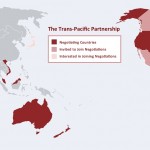TPP text released – 90 days to stop it!
The text of the Trans-Pacific Partnership has finally been released — and it’s as bad, if not worse, than expected.
When you think of “free trade,” you probably think about cargo ships, tariffs, and quotas. But only a small portion of the TPP addresses those issues. Instead, the majority of this long, complicated agreement sets the rules for all the countries in it – including the U.S. – on issues such as agriculture, food, intellectual property and patents, banking, and more. The agreement gives international corporations the ability to trump properly enacted domestic laws by attacking them as supposed trade barriers.
Here are just some of the highlights:
- The TPP gives importers the ability to challenge individual border inspection decisions, second-guessing U.S. inspectors about what food is safe and not safe to let into our country.
- The TPP threatens any serious limitation on genetically engineered foods. Although this portion of the text still isn’t available, the USDA’s website states: “The TPP … includes provisions on agricultural biotechnology that commit TPP countries to foster transparency in their decision-making processes, to work together on situations of low-level presence, and to promote timely authorization of products of modern biotechnology.” Translating that into regular English: Agribusiness and biotech companies will be able to use international tribunals to challenge countries that ban GMO imports, test for GMO contamination, do not promptly approve new GMO crops, or even require GMO labeling.
- The TPP undermines “Buy American” rules, even when American tax dollars are being spent. The TPP procurement chapter gives firms operating in any TPP nation equal access to U.S. government procurement contracts, rather than the government continuing to give preference to local firms to build and maintain our public roads, bridges, railways, post offices and universities.
- Thousands of new foreign companies would be able to use the TPP investor suit provisions to challenge federal, state or local laws that they claim interfere with their expected profit, bringing suit against our government in unaccountable international tribunals.
- And more jobs lost. The TPP Investment Chapter would make it easier to relocate American jobs to low-wage countries. As Communication Workers of America president Chris Shelton observed, “It forces U.S. workers to compete with the 65-cent an hour wages of Vietnamese workers and the slave labor employed in Malaysia.”
We’ll provide more information on the details of the TPP in the coming weeks. But don’t wait – you need to take action now! The Administration and Congressional leadership have already launched a PR blitz to try to win approval of the TPP, and we need to keep up the pressure on Congress to stand up for American farmers, workers, and consumers. Contact your member of Congress and tell them to reject the TPP!
The text of the TPP is available here
TAKE ACTION
Please call or e-mail your U.S. Representative and both your U.S. Senators. You can find who represents you:
- Online: www.house.gov and www.senate.gov
- By Phone: call the Capital Switchboard at 202-224-3121
Below is a sample message that you can use.
Phone calls have a much greater impact than emails. If you send an email, please be sure to personalize your message by adding a couple of sentences at the beginning about who you are and why these issues matter to you.
SAMPLE SCRIPT FOR A CALL or EMAIL:
I urge Representative/ Senator _____ to vote “No” on the Trans-Pacific Partnership.
A true free trade agreement would remove trade barriers such as tariffs and quotas — and it would stop there. But this agreement goes far beyond free trade and will undermine our domestic laws.
Proponents of TPP claim that exports will help our economy, including our farmers. But these are the same claims that were made during the debates for NAFTA, CAFTA, and the U.S.-Korean Free Trade – and they have been proven false. Instead, a few large companies benefit, while working class Americans have paid the price. Rural communities in particular have suffered increasing rates of poverty and food insecurity.
I urge you to vote No on the TPP.